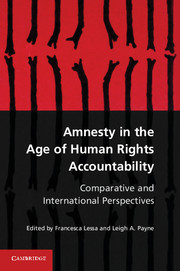Book contents
- Frontmatter
- Contents
- Contributors
- Foreword
- Acknowledgments
- Introduction
- Part I Theoretical Framework
- Part II Comparative Case Studies
- 3 Amnesties’ Challenge to the Global Accountability Norm?
- 4 From Amnesty to Accountability
- 5 Barriers to Justice
- 6 Resistance to Change
- 7 De Facto and De Jure Amnesty Laws
- 8 Creeks of Justice
- 9 Accountability through Conditional Amnesty
- 10 De Facto Amnesty?
- 11 A Limited Amnesty?
- 12 The Spanish Amnesty Law of 1977 in Comparative Perspective
- Conclusion Amnesty in the Age of Accountability
- Bibliography
- Index
- References
3 - Amnesties’ Challenge to the Global Accountability Norm?
Interpreting Regional and International Trends in Amnesty Enactment
Published online by Cambridge University Press: 05 June 2012
- Frontmatter
- Contents
- Contributors
- Foreword
- Acknowledgments
- Introduction
- Part I Theoretical Framework
- Part II Comparative Case Studies
- 3 Amnesties’ Challenge to the Global Accountability Norm?
- 4 From Amnesty to Accountability
- 5 Barriers to Justice
- 6 Resistance to Change
- 7 De Facto and De Jure Amnesty Laws
- 8 Creeks of Justice
- 9 Accountability through Conditional Amnesty
- 10 De Facto Amnesty?
- 11 A Limited Amnesty?
- 12 The Spanish Amnesty Law of 1977 in Comparative Perspective
- Conclusion Amnesty in the Age of Accountability
- Bibliography
- Index
- References
Summary
It is widely acknowledged that during the last decades of the twentieth century, the engagement of states with international human rights norms underwent a significant transformation. Evidence for this can be seen in states’ involvement in the creation of new human rights institutions and international treaties. For example, with the entry into force of human rights instruments such as Optional Protocol to the International Covenant on Civil and Political Rights (in 1976) and the American Convention on Human Rights (in 1978), participating nation states empowered human rights monitoring institutions to investigate individual complaints of state responsibility for human rights violations, even when the complaints were made by the states’ own citizens. In addition, through the enactment of treaties such as the Convention against Torture, states created new transnational offenses that state parties were obliged to prevent and punish. Furthermore, in addition to submitting themselves to greater scrutiny on their adherence to human rights, states have also increasingly sought to promote human rights overseas through rule-of-law programsand cooperation with an ever-increasing range of international and hybrid criminal courts that hold individual perpetrators accountable for serious violations of human rights and humanitarian law. These forms of state behavior were mirrored by an increased emphasis on human rights and the rule of law among international policymakers following the end of the Cold War. In a groundbreaking article in 2001, Ellen Lutz and Kathryn Sikkink labeled these developments a “justice cascade.”
In developing the justice cascade theory, Lutz and Sikkink relied primarily on developments in Latin America from the late 1970s to the late 1990s. They argued that during this period the region underwent “a rapid shift toward recognizing the legitimacy of the human rights norms and an increase in international and regional action to effect compliance with these norms.” Furthermore, pointing to the creation of the ICC in 1998 and increasing acceptance by domestic judges in several countries of the principle of universal jurisdiction for serious human rights violations, the authors argued that the justice cascade was “not limited to Latin America,” but was also “reverberating internationally.” These findings have been supported by other scholars who refer to the existence of “revolutions in accountability” or an “age of accountability.”
- Type
- Chapter
- Information
- Amnesty in the Age of Human Rights AccountabilityComparative and International Perspectives, pp. 69 - 96Publisher: Cambridge University PressPrint publication year: 2012
References
- 9
- Cited by



